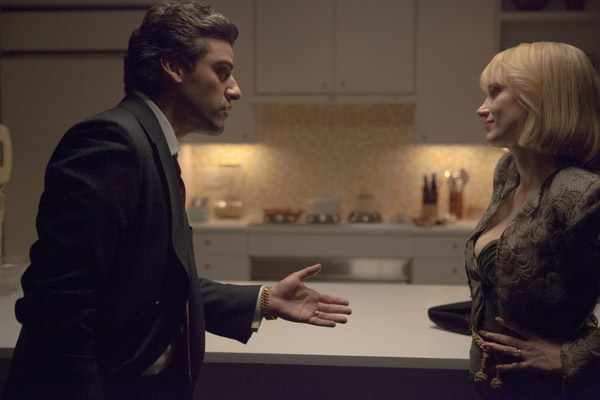![]() A Most Violent Man is not particularly violent, and it only takes place in a few months’ time, but the potential for everything to go south for the characters is constant. For a film with a penchant for wide shots, stately camerawork, and nary a hand held in sight, it builds up a palpable sense of dread. It achieves that by focusing on some old school standbys: strong characterization, linear plotting, and having (gasp) something to say.
A Most Violent Man is not particularly violent, and it only takes place in a few months’ time, but the potential for everything to go south for the characters is constant. For a film with a penchant for wide shots, stately camerawork, and nary a hand held in sight, it builds up a palpable sense of dread. It achieves that by focusing on some old school standbys: strong characterization, linear plotting, and having (gasp) something to say.
It begins with Abel Morales jogging through a fairly desolate New York City in 1981. This is crosscut with a driver of a truck carrying heating oil. He’s attacked by gunmen, and they steal his vehicle, which belongs to Abel. His company is Standard Heating. And he just put a down payment on waterfront property that will allow him to expand his company exponentially. It’s a big deal. He’s been planning it for years, and he now has a month to make the rest of the payments. Not only is he losing money from having his trucks stolen (they are found abandoned, all the oil gone), but his investors are getting nervous, and the head of the teamsters want the drivers to carry guns. Oh, and he has just purchased a stately home. All Abel wants is to operate his business cleanly and honorably.
Abel is a fascinating character. He is played with searing intensity by Oscar Isaac. Abel married into the family business, and his wife, Anna, is the streetwise but upwardly mobile daughter of a Mafia connected businessman. She loves Abel intensely, believes in him, and knows the business. But she doesn’t always trust his methods, and if need be, she will stick her nose in and do what she believes is best. She exudes an icy cool that disguises the fiery Brooklyn girl within. And if she doesn’t believe that Abel is protecting the family or the family business, she will take matters into her own hands. When Abel’s and Anna’’s aims mesh, you see their love and drive commingle, but when they clash, we’re privy to their resentment towards each other. Anna’s played by Jessica Chastain, who is also remarkable. In fact, the performances are marvelous across the board.
J.C. Chandor (who directed and also wrote the script) consistently surprises and confounds your expectations as to where a scene is going to go. Example: a truck is hijacked and a shootout occurs. The thieves do not expect the driver to have a gun, and they’re frustrated that he fires one and they have to shoot back. But they don’t want to hit him. They’re stupefied as to why he’s shooting. They only want the truck. And tell him so.
And a chase scene occurs unlike any I’ve seen. In fact, everyone who runs in this film is actually out of breath from exertion. That type of attention grounds the film. Chandor also emphasizes the actual lack of menace of individuals in what seems to be a menacing world. There are no real antagonists because no one really dislikes each other. Abel is chummy with his competitors, and the district attorney likes him enough to warn him he plans on bringing charges down on him. Everybody is just living their lives and working to get by.
Abel spends most of the film trying to figure out who’s stealing oil from his trucks, how to keep the loan he’s secured, and how to keep his wife from mucking up his business. He’s desperate to do so in as moral a way as possible. He’s an Ayn Rand anti-hero with empathy. He painfully tries to thread the needle through an ever-narrowing eye as circumstance tempts him time and time again to bend toward the dark side, and the the movie generates suspense on whether he does. Chandor wisely ties the heftier themes to a simple story device: Abel has 30 days to pay the rest of the deposit on the property or he loses it.
On occasion, the story line gets bogged down within the details of the plot, and towards the end, there’s the clumsy reintroduction of a character thought gone. But for the most part, A Most Violent Year delivers. It’s a sobering, thoughtful study of a driven, flawed man.







Leave A Comment